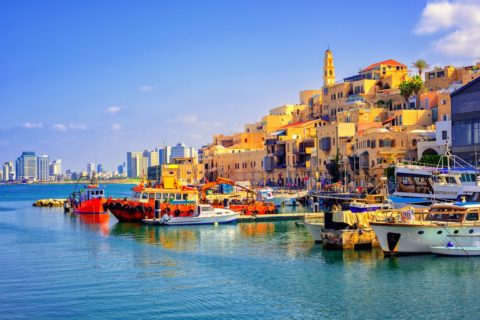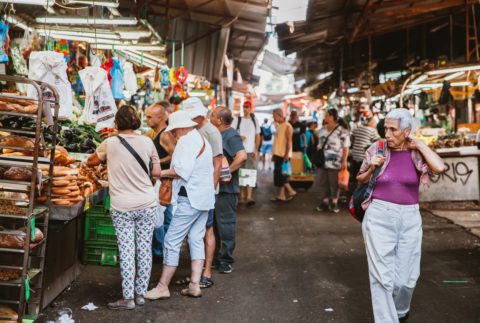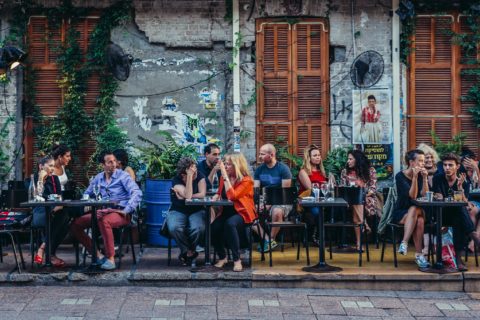What Tel Aviv Taught One Writer About Her Identity
"Here, my Jewishness doesn’t have to be hidden."
I have come face to face with several different types of anti-Semitism in my life: (1) the thinly veiled kind, at a dinner party, where a remark is made about Jews and their connections, (2) the facetious kind, at work, where a colleague jokingly says, “You don’t have to worry about money—you’re Jewish,” and (3) the overt kind that stares you square in the face. I can’t remember the last time I walked through a city without coming across at least one swastika graffitied on a wall. In one afternoon in Bogotá, I came upon six or seven. It’s jarring every time—not enough to ruin my day but just enough to remind me to keep my guard up and maybe not talk about my background. But travelling to Israel, I can shake off those anxieties. Here, my Jewishness doesn’t have to be hidden.
The border-patrol agent at Ben Gurion Airport studies my passport with a furrowed brow, looks back up at me from behind the glass and, with a positive inflection colouring his voice, asks, “Jewish?” I nod in response. “Welcome,” he continues, handing my passport back to me. My last visit was 10 years ago, when I was 19 and touring Israel on an organized youth trip, disillusioned by what felt like patronizing Zionist rhetoric. My connection to the country and to Judaism in general has always felt more cultural than religious: I grew up in a household where lobster was a favourite celebratory meal and Jewish holidays were an excuse to get together with family more than anything else. But that disillusionment was also a subconscious distancing from my identity, pushing away a part of me that never fully fit into the world outside the sheltered community I grew up in.
Being in the majority is a foreign feeling for me and one that comes with a bundle of conflicting emotions—predominantly guilt for being so readily welcomed when many, to whom Israel is home, are not. I took that privilege for granted at 19. Ten years later, at 29, I am as different as the country is.

Riding in a taxi into Tel Aviv, the city where my father was born and lived until he moved to Canada at 27, I hear a symphony of honking horns, blasting music and rattling motorcycle engines. I meet Rotem Alon, a local writer and TV host, on the border of Neve Tzedek, the first Jewish neighbourhood built outside the ancient port of Jaffa in 1887. As modern-day Tel Aviv grew, this area fell into disrepair. Today, though, its narrow streets are dotted with boutique hotels, cafés, shops and restaurants. We pick up an ice cream from Anita and stroll through the winding streets, discussing the history of this quaint corner of the city.
Alon stops to point out a tzabar, a brightly coloured prickly cactus bud. “It can grow in the desert—it’s a strong plant,” she explains. Pointing to its tiny thorns, she adds, “You don’t want to mess with it.” The symbolism of this Hebrew term, she tells me, stands for the new generation of Israelis. “On the outside, they’re really tough, but on the inside, they’re soft and sweet.” It’s controversial, forming a conception of today’s generation that’s in contrast to a stereotypical portrait of its predecessors, who would remain indoors and pray, isolated from the rest of society.
That was the Israel my father grew up in. He lucidly remembers the day, when he was six years old, that the country won its independence (in 1948) and the strife that immediately followed. “As we were dancing in the streets and celebrating, shots and bullets started flying toward us from Jaffa,” he says. “Then we heard on the radio that a war had broken out—that all the surrounding nations had declared war on Israel.”
Later, while we’re on our way to Carmel Market, Alon and I pass through another historic neighbourhood: Kerem HaTeimanim, which is filled with shops and cafés still run by their original owners, now centenarians. This is in stark contrast to the portrait that Alon painted of the tzabar and reveals a more traditional side of Israeli society.

The souk is boisterous and brimming with people, even on a Tuesday afternoon. Vendors selling mezuzahs and trinkets sit side by side with food stands whose offerings run the gamut from arepas to craft beers and burekas (flaky pastries commonly filled with mashed potato). This is a good indication of Israel’s diverse food scene, which begins with beautiful local ingredients and draws influences from a vast array of cultures.
On the higher end of the culinary spectrum, restaurants like Ran Shmueli’s Claro in Tel Aviv and Ilan Garousi’s Chakra in Jerusalem are a testament to a forward-thinking generation of chefs reinterpreting what Israeli food is and can be. Claro’s grilled sweetbreads with spinach, chickpeas, cucumber and labneh is a perfect example, an unpretentious dish that lets its ingredients speak for themselves, staying true to Israel’s Middle Eastern and North African influences while upholding its tradition of clean, fresh flavours.
When I was a kid and my mother would go away on business, my dad would take over mealtimes for my sister and me, and “Israeli salad” was always his failsafe dish. He would dice up tomatoes and cucumbers and dress them with lemon juice, olive oil and plenty of salt. (This was the only recipe in his arsenal and would inevitably be served alongside Kraft Dinner.) What I discover in Tel Aviv today is an impressive restaurant scene that could easily go toe to toe with the food capitals of the world.
The food is just one thing drawing an influx of visitors to Tel Aviv and the rest of Israel. Despite rising political tensions, 2017 saw record numbers of tourists touching down in the country, with a 25 per cent spike from the previous year. That may be part of the reason why Iceland’s WOW Air began offering flights from Toronto and Montreal to Tel Aviv, with opportunities to stop over in Iceland.
Before leaving Israel, I take a detour drive through the Golan Heights, a hilly region bordered by Lebanon, Syria and Jordan. At the very top, I stop to take in a shore-to-shore view of the Sea of Galilee. The privilege of being able to travel so freely through this contested area, bubbles to the surface of my mind. So does a sense of appreciation. With general xenophobia growing globally—even in Canada, where anti-Jewish sentiment has been steadily increasing for more than a decade—I can’t help but acknowledge how protected I feel here.








